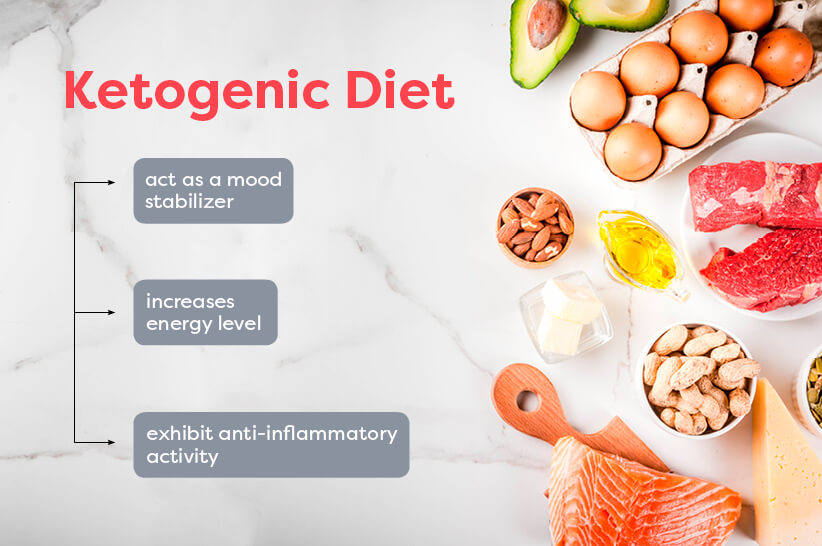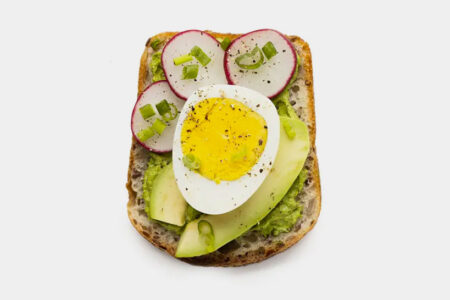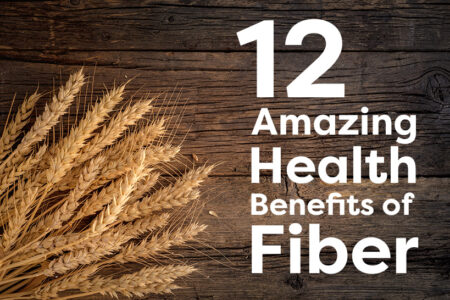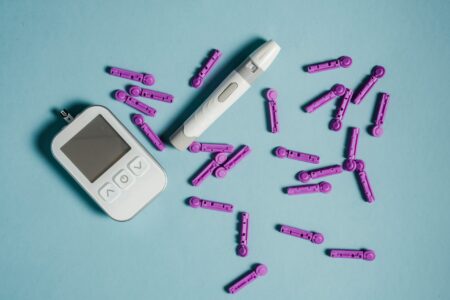We’ve looked at the overall health benefits of the keto diet, and now we’re going discuss the connection between keto diet for depression and anxiety.
These two conditions can slowly but steadily destroy the lives of affected individuals when left untreated. Sadly, they often get dismissed or undiagnosed because not everyone is brave enough to talk about their symptoms. And even if they did, a lot of times, they can get judged for making up stories and excuses by even their closest family members.
Understanding Depression and Anxiety
Depression
Depression is a common mental disorder affecting more than 300 million people of all ages in the world. The World Health Organization (WHO) states more women are affected by depression than men and that at its worst, depression can lead to suicide 1.
Depression is not the same as short mood swings, and it’s certainly not the same as crying for a day over an unfortunate life event. From having a negative impact on a person’s quality of life to contributing to the burden of other diseases, depression can act as a slow poison for the one who’s suffering from it 2.
In a lot of countries, depression often goes undiagnosed or not treated properly due to the lack of education regarding its consequences. Most people suffering from depression don’t have the guts to speak up and tell someone about it because they’re afraid of being judged of making up excuses.
Depression can be classified into three main categories:
- Mild: Someone who’s mildly depressed has some difficulties in continuing with their day to day work and social activities, but they likely won’t stop functioning altogether. Some symptoms of mild depression include hopelessness, irritability, loss of interest in favorite activities, lack of motivation, insomnia, and sudden lack of interest in socializing. Although mild depression can be treated easily than the other two, it’s often the one that goes undiagnosed due to the patient’s lack of interest in discussing it with anyone.
- Moderate: This shares all the symptoms of mild depression and also has other additional symptoms such as causing problems with self-esteem, self-confidence, increased sensitivities, and excessive worrying.
- Severe (major): Someone who suffers from major depression will experience all the symptoms of mild and moderate, but it will be more severe and noticeable by the people around them. Additionally, major depression can also cause delusions, hallucinations, and suicidal thoughts or behaviors. It also requires urgent medical treatment.
Anxiety
Anxiety is a feeling of fear, worry, nervousness, and uneasiness about something and it’s often recurrent in those who have chronic anxiety disorders. Feeling a bit anxious on certain occasions like the first day of school, at a job interview, or during a public speech is considered normal, and it’s something most people experience.
However, if those feelings are severe and chronic to the point they start having a negative impact on the quality of your life, that’s when you know you need to seek professional help. Some physical symptoms of anxiety are trembling, sweating, dizziness, or rapid heartbeat 3. Anxiety is also an underlying condition associated with depression and for someone who suffers from anxiety disorder, the symptoms may never really go away and can get worse over time.
Factors Contributing to Depression and Anxiety
Researchers have found that both depression and anxiety disorders are caused by a combination of genetic and environmental factors. Let’s have a look at some risk factors contributing to these conditions.
Factors contributing to depression
Some contributing factors of depression include 4:
Family history
Since depression can also be caused by genetic factors, having a personal or family history of it can increase the risk of developing it.
Major life changes & trauma
Major life changes such as and trauma caused by certain life events such as the death of a loved one, divorce, betrayal, and breakup can contribute to depression.
Certain medications and health conditions
Some illnesses and certain medications such as isotretinoin can also contribute to depression.
Factors contributing to anxiety
Some contributing factors of anxiety disorders include 5:
Stressful or negative environment
Being exposed to stressful or negative environments during childhood or adulthood can contribute to anxiety disorders. For instance, children who’ve experienced any form of abuse can have a higher risk of developing an anxiety disorder.
Heredity
If anxiety or any mental illnesses are present in biological relatives, this may also contribute to developing an anxiety disorder.
Certain health conditions
Some health conditions such as thyroid problems and heart arrhythmias can also contribute to anxiety. Excess caffeine consumption and certain medications can aggravate anxiety symptoms.
Is Keto Good for Depression and Anxiety?
If you read some of the keto success stories, one thing that will never fail to stand out is how a lot of them feel great after being on keto. A lot of people have also shared how they don’t feel depressed or anxious anymore on the ketogenic diet. Have a look at this Reddit thread, for instance; a user has reported how their depression is “gone” while being on the keto diet and other people have also commented similar experiences.

Well, science seems to back up the mental health claims of the keto diet such as improvement in stress, depression, and anxiety. One of the best ways the keto diet helps treat depression is by improving the overall self-esteem and self-confidence of an individual. Let’s discuss exactly how the keto diet can help with depression and anxiety.
How Keto Helps in Depression and Anxiety
Keto and mood
The ketogenic diet is thought to act as a mood stabilizer because of its anticonvulsant properties, positive energy changes in brain profile, and the ability of ketosis to decrease intracellular sodium concentrations 6.
A 2004 study tested the mood stabilizing properties of the ketogenic diet on rats 7. They used the porsolt test to compare the results of the rats on the ketogenic diet with the rats in the control diet. The results revealed that rats in the keto group spent less time immobile and they stated that this result is similar to how rats treated with antidepressants would react. Thus they concluded that the ketogenic diet might have antidepressant properties.
Keto and energy levels
The ketone bodies on a ketogenic diet have been found to produce more ATP for energy than glucose, and they’re also metabolized faster. Glucose, on the other hand, has to go through glycolysis first.
The sluggishness and fatigue associated with high carb diets are reduced significantly on the ketogenic diet, leading to improved overall energy. As discussed earlier, lack of energy to participate in activities is one of the symptoms of depression, and the keto diet can help reduce that symptom by increasing energy level.
Keto and inflammation
It is a known fact that high carb diets increase the risk of inflammation, especially in overweight and obese individuals 8. Chronic inflammation and oxidative stress are two significant underlying factors of many diseases, including neurological conditions such as depression and anxiety.
The ketogenic diet has been found to exhibit anti-inflammatory activity by inhibiting 9:
- nuclear factor kappa-light-chain-enhancer of activated B cells (NF-kB) activation
- nucleotide-binding domain
- leucine-rich-containing family
- pyrin domain-containing-3 (NLRP3) inflammasome
- histone deacetylases (HDACs)
And also by improving memory encoding.
A 2016 study conducted found that exogenous ketone supplements reduced anxiety-related behaviors in rats. They also concluded that it reflects the potential anxiolytic effect of nutritional ketosis 10.
Keto and neurogenesis
Neurogenesis is the process of growth and development of the nervous tissues. Studies have demonstrated that stress reduces the activity of BDNF (brain-derived neurotrophic factor) expression or activity in the hippocampus and this can usually be prevented by antidepressant drugs 11. Research states that beta-hydroxybutyrate (the main ketone body) can induce BDNF expression 12.
Can I Take Medications for Depression and Anxiety While on Keto?
This is something you should discuss with your doctor to see if it’s okay for you to take the medications while you’re on the ketogenic diet. If any of those medications say, you need to take them after a meal, do as it says and avoid taking them on an empty stomach for the sake of intermittent fasting.
That said a lot of people in the ketogenic community have, and still do take their antidepressant and anxiety medications fine without any adverse effects. Some people have even gotten to the point of lowering their medication doses or being completely free.
Takeaways
- The neurological benefits of the keto diet are continuously being studied, and we’ve already seen plenty of evidence to support its health benefits such as improved cognitive function, improvement in memory, and brain function.
- The current evidence sheds a positive light on the effect of the ketogenic diet on depression and anxiety. For instance, people who’ve lost weight on this diet never fail to mention how great and confident they feel about themselves after a long time. Low self-esteem and self-confidence are associated with depression. Thus, this is one of the ways the keto diet can help reduce the symptoms of depression.
- As stated above, do not disregard your medications for the sake of keto and consult with your doctor if it’s safe for you to take them while you’re on this diet. We look forward to seeing more human trial evidence to support the antidepressant and anxiolytic properties of the keto diet.










![Juicing for Weight Loss: Everything You Need to Know [Plus Recipes]](/wp-content/uploads/2019/08/Juicing-for-Weight-featured-image.jpg)








